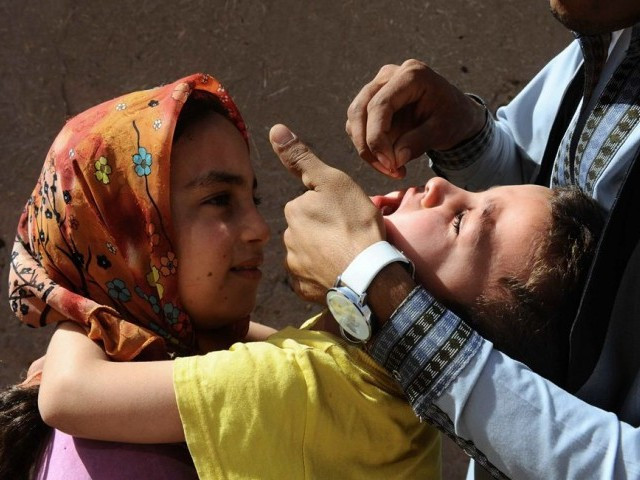Virus marks its presence in K-P as anti-vaxxers hold ground
Positive sewage sample in Peshawar brings quality of polio campaigns to question

PHOTO: AFP

The three cases which have been confirmed as yet were in Peshawar, Nowshera and Hangu. Had the cases been reported from inaccessible areas, there would have been some wiggle room for officials. But the existence of the virus in the provincial capital and neighbouring Nowshera raise questions over the “quality” of polio campaigns and their “monitoring”.
Questioning quality
“No, it’s not about vaccinating children or saying 5.3 million children would be targeted; the challenge truly is to target the missing ones and those [whose parents] still refuse [inoculation],” a former health employee who had been part of polio eradication efforts for several years told The Express Tribune.
The official, requesting anonymity, said stakeholders must focus on effective monitoring and the quality of campaigns instead of quantity. “Otherwise it won’t work. You can hold 10 campaigns for 10 consecutive days but if you fail to carry out effective monitoring, don’t even think about achieving your objectives,” the official said.
Waiting on promises
On different occasions, the provincial government has been quoted as saying the province will get rid of the poliovirus by 2016. During a meeting held a fortnight ago with various stakeholders, including donor agencies and officials from the K-P emergency operation cell, the government reiterated its stance.

Minister for Health Shahram Khan Tarakai issued directives for action against those responsible for insufficient coverage and discussed “focusing more on high risk areas”.
It was finally decided local government representatives would be involved in eradication efforts and polio workers deployed at high-risk union councils on a “permanent basis”. The health ministry warned of action against those found guilty for negligence including local or partner organisations.
“The provincial government is in the final stage of eradicating polio and it cannot afford any kind of negligence or mistake,” Tarakai was quoted as saying during the meeting. “In case of any such negligence, the officials or partner organisations would be held responsible.”
Threat persists
According to officials involved in the polio campaigns, the decisions were possibly taken following pressure from the international community when they observed the virus existed only in Pakistan and Afghanistan, and so continued to pose a serious threat globally.
This was expressed during the eighth meeting held by the Emergency Committee under the International Health Regulations (IHR) in February. The meeting concluded the spread of poliovirus remains a public health emergency of international concern.
According to a UN official, the two polio cases reported from Nowshera and Hangu were traced back to Afghanistan. Around 5,000 parents refused to let their children take oral polio vaccine during a recent campaign in February. The highest number of refusal cases, around 2,000, was confirmed from the provincial capital, 391 were reported from Nowshera.
Published in The Express Tribune, March 10th, 2016.













COMMENTS
Comments are moderated and generally will be posted if they are on-topic and not abusive.
For more information, please see our Comments FAQ